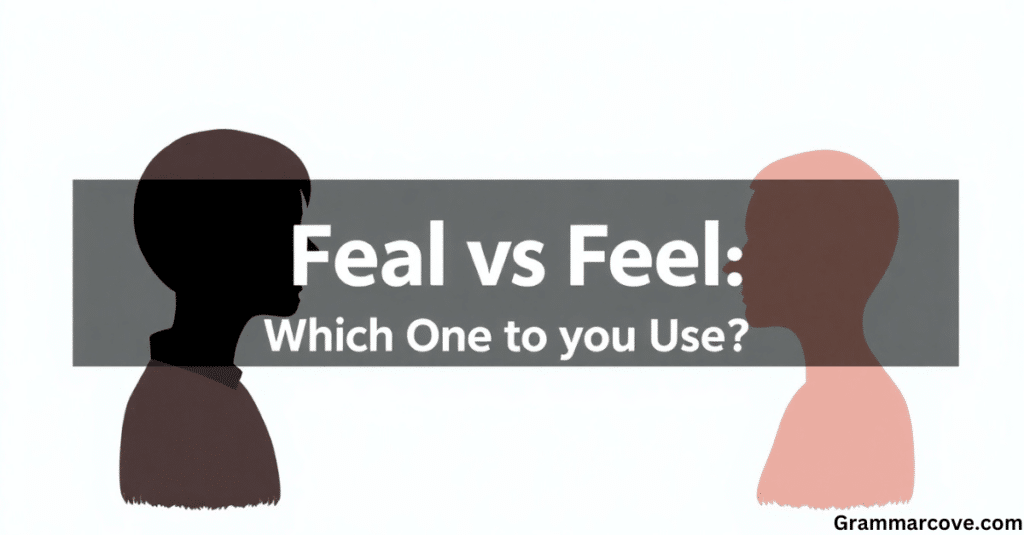When writing in English, certain pairs of words sound alike yet carry vastly different meanings. This is the case with Feal vs Feel. While these words are phonetically identical, their meanings, usage, and even origins couldn’t be more different. In today’s modern English, the word “feel” is commonly used to express physical sensations or emotions. “Feal,” on the other hand, has a historical background and has largely fallen out of everyday usage. However, it still occasionally appears in poetic or literary contexts.
Let’s explore the Feal vs Feel meaning differences, usage, and see which word fits best in various contexts. This article will help clarify when to use Feal or Feel and deepen your understanding of the differences between Feal and Feel.
Table of Contents
- Feal vs Feel Meaning
- Feal vs Feel Spelling
- Feal or Feel: When to Use Each
- Difference Between Feal and Feel
- Meaning of Feal
- Meaning of Feel
- Historical Meaning of Feal
- Emotional Experience (Feel)
- Examples and Usage Scenarios
- Feal in Poetic Context
- Synonyms of Feal and Feel
- Summary Table of Differences
Feal vs Feel Meaning

Feal and Feel share a similar pronunciation but are used very differently. In short:
- Feel is a versatile term that relates to emotions, physical sensations, and reactions.
- Feal is an archaic term meaning loyal or faithful, rarely seen outside poetry or historical writing.
Feal vs Feel Spelling
The spelling of Feal vs Feel may cause some confusion, especially since both words sound the same. English writers often default to “feel,” given its everyday usage. “Feal,” however, is rarely used outside of specific literary or poetic works.
Feal or Feel: When to Use Each
When to Use “Feel”
Use feel to describe:
- Physical sensations (e.g., “I feel cold.”)
- Emotions (e.g., “I feel happy.”)
- Intuitive reactions (e.g., “I feel like we should go.”)
When to Use “Feal”
Feal is best used:
- In a literary or poetic context, to convey loyalty or allegiance.
- When writing historical fiction to give a sense of authenticity.
In practical terms, unless you’re deliberately aiming for an archaic or poetic tone, feel is the word to use in modern writing.
Difference Between Feal and Feel

The primary difference between Feal and Feel boils down to their meanings:
- Feel describes physical or emotional sensations and is widely used in everyday language.
- Feal means loyalty or faithfulness and has largely fallen out of common usage.
For example, saying, “I feel happy” conveys an emotion, while “He was feal to his king” speaks to a sense of allegiance or loyalty.
Meaning of Feal
The meaning of Feal can be best understood in its historical context. In Middle English, feal signified loyalty, dedication, or faithfulness. This word once held significance, especially in relationships of loyalty, such as that between a knight and his lord.
Example: In the sentence, “Sir Thomas was feal to his king,” “feal” emphasizes Sir Thomas’s unwavering loyalty and devotion.
Meaning of Feel
In contrast, the meaning of feel is directly tied to sensation and emotions. “Feel” can function as both a noun and a verb:
- As a verb: It describes the act of experiencing a sensation or emotion (e.g., “I feel excited.”).
- As a noun: It can refer to the quality of a surface or to an instinctive sense (e.g., “The fabric has a soft feel.”).
Historical Meaning of Feal
The historical meaning of Feal connects with the concept of loyalty and allegiance. This term is derived from Middle English, where feal was commonly used to describe loyalty and devotion. Though it has fallen out of modern usage, you may still find feal in historical texts, poetry, or literature that seeks an old-world feel.
For instance, a line in a historical novel might read: “The soldiers were feal to their commander, each ready to fight till the end.”
Emotional Experience (Feel)
The word feel is deeply associated with emotional experience. When we say “feel,” we could be talking about both physical touch and inner emotions. In fact, sensory perception (feel) includes everything from noticing the texture of a surface to experiencing an emotion.
Examples of Feel as a Verb:
- “I feel joy when the sun is shining.”
- “Do you feel the warmth of the fire?”
Examples of Feel as a Noun:
- “This blanket has a cozy feel.”
- “I have a feel for how this system works now.”
Examples and Usage Scenarios
Scenario 1: Email Example Using “Feel”
Email to a Friend
“Hi Alice,
I feel like we should plan a trip sometime soon. I’ve been feeling a little drained, and some fresh air might help. Let me know how you feel about it!”
Scenario 2: Literary Use of “Feal”
Poetry Excerpt
“In loyal hearts, a feal flame does burn,
A pledge that asks for naught in return.”
Scenario 3: Conversation
- Speaker 1: “I feel this might be a bad idea.”
- Speaker 2: “Well, if your instincts say so, we should trust them!”
Feal in Poetic Context
Feal in poetic context lends a classic, historical feel to writing. Writers may use feal to convey devotion or allegiance in a way that elevates the language. For instance, a poet might write, “Feal to thee, I stay beside, like tides that to the shore abide.”
Using “feal” in this way invokes a sense of romantic loyalty that modern words like “faithful” or “loyal” don’t fully capture.
Synonyms of Feal and Feel
Understanding synonyms can help further distinguish Feal vs Feel in your writing.
Synonyms of Feal
- Loyal
- Faithful
- Steadfast
- Devoted
- Allegiant
These synonyms may work well in modern writing when you want to express the concept of loyalty or faithfulness without the archaic flavor of “feal.”
Synonyms of Feel
- Sense
- Perceive
- Experience
- Detect
- Discern
These words all convey the notion of sensory perception or emotional experience in different contexts, making “feel” highly versatile in English.
Summary Table of Differences
| Word | Meaning | Usage | Context |
|---|---|---|---|
| Feal | Loyalty, faithfulness | Rare, poetic | Archaic or Middle English usage |
| Feel | Sensory perception, emotional experience | Common | General, everyday use |
Conclusion
When deciding between Feal vs Feel, remember their distinct meanings and uses. Feel is almost always the appropriate choice in modern contexts to describe emotions or physical sensations. Feal, while mostly obsolete, still holds value in specific poetic or historical contexts where loyalty and allegiance are central themes.
Understanding the difference between Feal and Feel enhances not only your vocabulary but also your ability to craft language with precision and nuance. Whether you’re writing everyday emails or penning poetry, knowing when to use Feal or Feel can make your writing both accurate and expressive.


